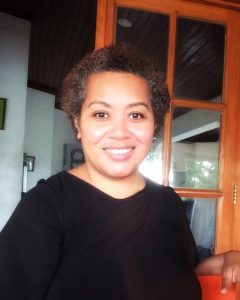

Laisa Bale.
Laisa Bale commended the Fiji National University’s (FNU), College of Agriculture, Fisheries and Forestry (CAFF) for extending its courses to students in Vanua Levu.
53-year-old Bale is currently studying the Certificate in Commercial Agriculture (Level 3) at FNU’s Naduna campus in Labasa. CAFF had extended its agriculture programmes to FNU’s Labasa campus from Semester 2, 2023.
“I commend CAFF for offering this course to students in Vanua Levu, as we have often highlighted the difference in opportunities this side of the land is offered in comparison to Viti Levu. The expansion of this course to Vanua Levu is a step in the right direction,” Bale said.
“Firstly, it curbs the urban drift of our students and later of their parents. Most students leave Vanua Levu for higher education in Viti Levu.”
“Often, their aged farming parents have no social support. This may lead students to drop out or parents having to move islands to be near their children. This course will help curb this challenge where students who want to study can do so in Labasa but be near to assist their parents.”
“Secondly, it is cheaper for the students to study in their hometown. Students also do well academically if they have social support from their families. This course will enable students to live with family while pursuing an education instead of resettling in a new environment.”
Bale, hailing from Navutua Village in the Province of Bua, grew up in a farming background. Her late paternal grandfather was a well-known cattle rancher in the province of Bua supplying meat to Fiji Meats Ltd.
“Thirdly, for farmers like me who cannot leave the island because of our vested interest in our farms, this course is a blessing. We can learn while we farm, and we don’t have to move to another island to upskill and gain knowledge.”
Originally from Labasa, Bale, who calls herself a full-time farmer now, decided to make a career change in her mid-forties to go into farming.
She holds a Bachelor of Laws (Honours) from the University of Sussex in England, a Postgraduate Diploma in Legal Practice from the University of the South Pacific (USP), Masters in Public Administration from Harvard University, Kennedy School of Government, and a Postgraduate Diploma in Development (USP).
“There were a lot of factors that played a role in this career switch. First, I was given land from my tribe. The second is that agricultural data seem to indicate that farming has good investment returns if you do it right. The third was based on a calling to pursue farming.”
“The first interesting aspect of this course is the application of what we learn in class to our farms. Where we have erred, this course sets us in the right direction, and we are able to pivot our farms accordingly.”
“As a bridge, the course enables farmers to gain new skillsets and knowledge to help them run a commercial enterprise. The course covers how to register your business, how to construct the master farm plan and operating budget, the uses of technology and machinery, and large-scale crop farming.”
Her motivation for undertaking the course was to learn the basics of running a commercial farm.
“So far, the Labasa facility has state-of-the-art equipment that enables us to learn online, supported by a course coordinator, providing a brilliant opportunity for students in the north of Fiji to learn without the need to travel to Viti Levu.”
“There is a lot of good advice from each of the lectures so far that I have attended at FNU that has refined my approach to farming or changed the direction in my farm management. I am very grateful that I was allowed to undertake this course.”
“The course is also structured in such a way that one can farm and study at the same time; this term, we are undertaking four units, but we still have time before class to attend to our farms and return to it after class.”
Bale said she would like to pay tribute to her father, who encouraged her to stay close to the land no matter how far across oceans her white-collar job would take her.
“I vividly recall as a child the advice he gave us when we were considering career options is that the land will always be there for us,” she said.
“We could travel extensively and attain all the education that we could acquire but we had the option of returning to the land. I have come full circle with that advice.”
Open Day
The FNU 2023 Open Day will be held at the Naduna Campus, Labasa, from October 5-6, Nasinu Campus, Suva, from October 6-7, Namaka Campus, Nadi and Natabua Campus in Lautoka on October 6.
Prospective students and those interested can stay updated regarding the FNU 2023 Open Day by following the University’s FNU website and the official social media platforms on Facebook, Instagram, LinkedIn and Twitter.